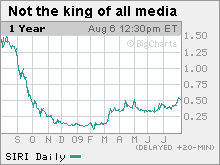Satellite radio profit? You cannot be Sirius!
Sirius XM is losing money - and subscribers. But if the auto industry continues to rebound thanks to Cash for Clunkers, the company may have a new lease on life.

 |
| Sirius XM has bounced back from its all-time low but the shares are still mired in penny stock status. |
NEW YORK (CNNMoney.com) -- No. John McEnroe didn't write the headline for this column. And yes, Sirius XM Satellite Radio posted a profit in the second quarter. Sort of.
The home of Howard Stern did its best to try and convince investors that it made money in the quarter, saying in the first sentence of its press release Thursday that it had adjusted income from operations of $132 million. Sirius XM also said in the first paragraph that it was raising its full-year guidance for adjusted income for operations.
However, this figure excludes a host of costs, such as depreciation and amortization, restructuring charges and interest expense tied to debt payments. So if you dig deeper, you'd find that the company really lost $157.3 million in the quarter, nearly double the loss from a year ago.
To be fair, many media companies, including mine (Time Warner) play the pro forma profit game because of various costs somewhat unique to your business.
But Wall Street was not fooled by the pro forma profit game, i.e. we're making money if you just ignore a bunch of stuff. Shares of Sirius XM (SIRI) fell nearly 2% Thursday.
Now losses are not new for the company. Even in good economic times, it's been a challenge for Sirius XM to make money. Before Sirius and XM merged last year following a lengthy antitrust review, the two companies routinely posted big splotches of red ink.
But it appears that the recession is taking a toll on subscriber growth, and that could be a problem. Although revenue was up 1% from a year ago thanks to existing subscribers paying higher monthly fees, the company said it ended the quarter with nearly 186,000 fewer net subscribers than it had in the first quarter.
Now all is not lost for Sirius. The company could benefit from the Cash for Clunkers-induced lift to auto sales that Ford (F, Fortune 500) and other big car companies reported earlier this week.
Sirius XM has installation agreements with all the major automakers. Approximately 55% of the company's total subscriber base comes from the automotive segment, with the remainder coming from consumers buying radios at big retailers such as Best Buy (BBY, Fortune 500) and Wal-Mart (WMT, Fortune 500).
"We are well positioned for a rebound in auto sales," said Sirius XM chief executive officer Mel Karmazin in a statement Thursday.
David Bank, an analyst with RBC Capital Markets, agreed that the company's fortunes should improve if the worst is over for the auto industry. In fact, Bank said the subscriber loss in the quarter was not a surprise given how poor the economy was, and added that Sirius actually lost fewer subscribers than he expected.
It also seems that Sirius, much like the nation's big banks, has taken a step back from the brink. Sure, the stock still trades for a paltry 53 cents a share. But that's a substantial improvement from the all-time low of just a nickel a share it hit in early February.
Concerns about the company's debt load and a possible need to file for bankruptcy have ebbed since John Malone's Liberty Media (LCAPA, Fortune 500) agreed to loan Sirius XM $530 million in exchange for a 40% stake in the company.
With that in mind, some value investors are betting that the stock could rally further from its depressed levels as long as liquidity crunch fears continue to recede and the economy keeps improving. So it could be worth a gamble for investors with the stomach for risk.
"It is still a highly risky speculative situation. But I'm willing to take a chance on Sirius XM since it's a great concept and a good product," said Don Hodges, co-manager of the Hodges Fund, which owns a small stake in the company and has also made contrarian bets on former Wall Street darlings such as Crocs (CROX) and Krispy Kreme (KKD).
Hodges said he is hopeful that the company will continue to cut costs -- Sirius XM said Thursday that cash operating expenses have decreased 28% since the merger. In particular, Hodges thinks the company should be able to avoid overpaying for programming in the future.
Before Sirius and XM merged, the companies were caught in a tough battle for customers. That led to some pricey contracts for on-air personalities. And with the exception of Stern, Hodges said few of these deals led to enough new subscribers to justify the costs.
"The companies went crazy spending on programming. Expenses for talent were out of control. That should be less of an issue now that Sirius and XM are not competing against each other," Hodges said.
So Sirius XM may have dodged a bullet now that the auto industry and overall economy seem to be stabilizing. But Bank cautions that investors shouldn't really expect a return to the heady levels of subscriber and sales growth that the companies were able to report when they first launched a few years ago.
That may not be a bad thing though. At this point, Sirius XM needs to focus less on growth for the sake of growth and more on how to turn adjusted income from operations into good old-fashioned real net income.
Talkback: Do you think Sirius XM will still be around in five years? ![]()

